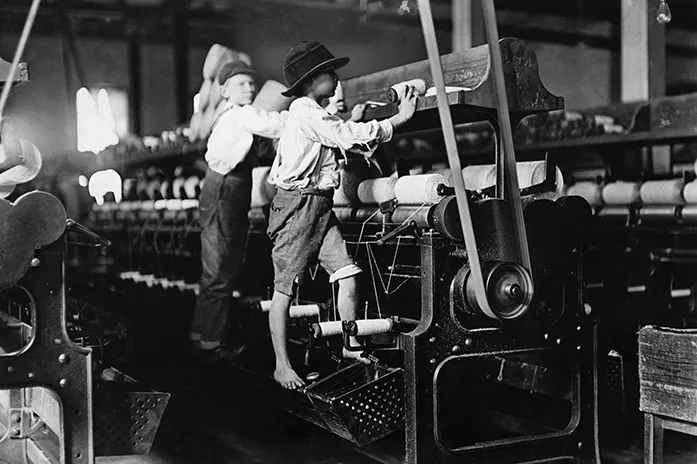
- 406 pages
- English
- ePUB (mobile friendly)
- Available on iOS & Android
eBook - ePub
About this book
Comprehensive yet accessible, this classic text, now in its thirteenth edition follows the evolution of political thought over 300 years. Organized chronologically, this text examines each ideology within a political, historical, economic, and social context. In addition to a thorough updating of examples and data, here's what you'll find in the new edition:
- Analyses of President Trump's rollback of Obamacare, trade war with China, and changes to immigration, taxation, and environmental policy.
- Conservative justifications for supply-side economics and liberal rationale for drug legalization and "trigger-word" bans.
- Brexit's effects on the Scottish independence movement.
- Resurgence of feminist protest, including the Me Too movement, alongside anarchist protest, following Trump's election, including groups like Black Bloc and Antifa.
- China's rising environmental and social problems, including unrest among its heavily controlled Uighur population.
- Cuba's transfer of power from the Castros to President Díaz-Canel, and their fraught rapprochement with the U.S.
- Russia's disinformation campaigns, and alternating brinksmanship and détente between Trump and North Korea's Chairman Kim Jong-un.
- The ascent of the Alt-right in the U.S., and white supremacist influence on parties in the U.S. and Europe.
- The continuing salience of Islamism, the teetering Iran deal, and ongoing degeneration of the Arab Spring to the Islamist Winter.
Frequently asked questions
Yes, you can cancel anytime from the Subscription tab in your account settings on the Perlego website. Your subscription will stay active until the end of your current billing period. Learn how to cancel your subscription.
No, books cannot be downloaded as external files, such as PDFs, for use outside of Perlego. However, you can download books within the Perlego app for offline reading on mobile or tablet. Learn more here.
Perlego offers two plans: Essential and Complete
- Essential is ideal for learners and professionals who enjoy exploring a wide range of subjects. Access the Essential Library with 800,000+ trusted titles and best-sellers across business, personal growth, and the humanities. Includes unlimited reading time and Standard Read Aloud voice.
- Complete: Perfect for advanced learners and researchers needing full, unrestricted access. Unlock 1.4M+ books across hundreds of subjects, including academic and specialized titles. The Complete Plan also includes advanced features like Premium Read Aloud and Research Assistant.
We are an online textbook subscription service, where you can get access to an entire online library for less than the price of a single book per month. With over 1 million books across 1000+ topics, we’ve got you covered! Learn more here.
Look out for the read-aloud symbol on your next book to see if you can listen to it. The read-aloud tool reads text aloud for you, highlighting the text as it is being read. You can pause it, speed it up and slow it down. Learn more here.
Yes! You can use the Perlego app on both iOS or Android devices to read anytime, anywhere — even offline. Perfect for commutes or when you’re on the go.
Please note we cannot support devices running on iOS 13 and Android 7 or earlier. Learn more about using the app.
Please note we cannot support devices running on iOS 13 and Android 7 or earlier. Learn more about using the app.
Yes, you can access Political Ideologies by Leon P. Baradat,John A. Phillips in PDF and/or ePUB format, as well as other popular books in Politics & International Relations & Political History & Theory. We have over one million books available in our catalogue for you to explore.
Information
Edition
13Subtopic
Political History & TheoryCHAPTER 1
Ideology
Preview
Ideologies are predicated on the Age of Enlightenment belief that people could improve their conditions by taking positive action instead of passively accepting life as it came. This new belief was accompanied by the great economic and social upheaval caused by the mechanization of production (the earliest stage of the Industrial Revolution). Indeed, one of the major themes of this book is that ideologies are the result of political accommodations to the economic and social conditions created by the Industrial Revolution.
Political scientists do not agree on the exact definition of the term ideology, but their opinions have enough in common to allow us to support the following definition: Political ideologies are usually simply stated and oriented toward masses of people. They are materialistic, activist, and often impatient with delay.
Ideology and political philosophy each express theories of politics, but political philosophy is addressed to the individual and is more intellectually profound and introspective.
The Development of Ideology
Prior to the modern era, with a few brief exceptions, people were discouraged from seeking solutions to their problems. They were expected to do what they were told by their spiritual and temporal superiors. Politics had not yet become democratized. Ordinary people were not allowed to participate in the political system. Politics was reserved for monarchs heading a small ruling class. Indeed, the Prussian king and military genius Frederick the Great (1712–1786) once said, “A war is something which should not concern my people.” In other words, politics was not the business of ordinary people. Rather than enjoy a voice in government, the masses were expected to work, producing material goods to sustain the state; they were not mobilized for political activity. In exchange for their obedience and productivity, the ruling class provided order and stability. Such was the social contract.
This attitude would be viewed as arrogant by contemporary observers, but only because every modern society is democratic in at least one sense of the word. Every modern political system is motivational; that is, leaders attempt to motivate and mobilize citizens to accomplish the political, economic, and social goals of the society. They are all intensely interested in involving their citizens in efforts to accomplish the objectives of the state, and ideologies are among the most important tools used by modern governments to mobilize people. Consequently, modern ideologies call upon people to join in collective efforts. The goals of each ideology and the precise methods used to reach these goals are different, but they each call for mass mobilization and collective efforts to accomplish desired ends. In this sense, ideologies are indispensable tools of the people who govern and of the people who are governed. As a consequence, familiarity with the most important ideologies is critical to our understanding the world in which we live.
The Source of Ideology
Knowledge, as it was commonly understood before the Enlightenment, was to be revealed by an authority with superior wisdom; common folk were to understand and conform to such knowledge as best they could. Consequently, little questioning or challenging was encouraged among ordinary people, and as a result, change came very slowly.
Gradually, however, people began to challenge this intellectual straitjacket. Some, like Galileo Galilei, were punished for doing so. Galileo proved the Copernican theory that the Earth and other planets revolve around the sun, making it—not the Earth—the center of the universe. Fearing that this assertion threatened the Catholic Church’s primacy over truth, the pope had Galileo tried before the Inquisition and forced to recant. Of course, as Galileo must have known, the truth could not be suppressed forever.
Despite extreme efforts of the spiritual and temporal leaders to suppress “inconvenient truths,” scholars and philosophers continued to probe and question, and in time, their efforts led to discoveries that revolutionized human existence. The net result of these accomplishments was the development of science and its practical application: technology. Successful early attempts to solve problems through the application of science, such as curing disease or developing labor-saving devices, gave people a new sense of empowerment. Liberation from the fetters of ignorance filled some with exhilaration, inquisitiveness, and inventiveness. Suddenly, after centuries of slavish obedience to tradition and conventional wisdom, the world became more rational and could be approached systematically. Invigorated by this secular epiphany, people were encouraged to apply human reason to an ever-widening range of problems.
In time, innovators developed machines that greatly increased productivity and drastically changed people’s relationship to the things produced. Whereas production and consumption were once limited to the tiny quantities that could be fashioned by hand, the new technology permitted a previously unimagined abundance, and thereby introduced important economic, social—and eventually—political transformations. For example, the average worker was no longer actually making goods. Instead, workers found themselves simply the custodians of machines that wove fabric, forged steel, or carved wood. Rather than building a whole carriage, for example, workers now found themselves on an assembly line monotonously performing one tiny aspect of automobile production and then passing it on to the next person to contribute their minute task. Eventually the finished vehicle rolled off the line, but no one could claim credit for actually building it. Thus, industrialization brings abundance, but it also shrouds production with anonymity, and some of the satisfaction of accomplishment is lost.
These changes in productivity had enormous social consequences. People who once led relatively healthy, albeit poor, lives in rural settings were brought together to live in cities. The workers’ neighborhoods were crowded and unsanitary. Ironically, life became less social as people found themselves psychologically estranged from their neighbors at the very time when they were forced to share the same city block. For millennia, people had depended on a close relationship with the soil for the necessities of life. Now, suddenly, they found themselves divorced from the land. Urbanization and industrialization, accomplished by brutal methods during the eighteenth and nineteenth centuries, caused massive confusion and insecurity among most ordinary people, who then became disoriented and frightened. No longer could they produce most of the things they needed themselves. They were transformed into anonymous cogs of giant economic systems and, as such, were dependent for their well-being on people they did not know, in places they had never seen. Scholars, philosophers, and politicians tried to comprehend these events, to explain and rationalize them, and to accommodate the social and political changes they evoked in this “brave new world.” Some of these rationalizations became political ideologies.

Photo 1.1
This scene of an eighteenth-century cotton mill illustrates how dangerous jobs assigned to children could be in the early Industrial Revolution. That this mill was located in the state of Georgia reminds us that child labor exploitation existed no less in the United States than in any other industrializing society of the era.
Source: © Bettmann/Getty Images
If the mechanization of production, the urbanization of society, and the separation of people from an intimate relationship with the land had been all that people had to face, the impact on human life would have been great indeed. However, even more turmoil lay ahead. Economic dislocation became a severe problem. Unemployment, depression, and inflation began to plague society and disrupt the order of things to a degree previously not experienced. Workers became disoriented as the skills that had once been a major source of self-identification and pride were made unnecessary by automation. It became necessary to learn new skills to accommodate the new technology. At the same time, workers became dissociated from owners. The capital investment necessary to buy machines, factories, and resources became so great that owners had to spend their time managing their money (becoming capitalists); they were no longer able to work alongside their employees as they once had in their cottage-industry shops. Lulled by the monotony of the assembly line, workers became separated from their employers—who may no longer be the master craftsman in the shop, but simply the owner of the factory—estranged from impersonal managers, and ultimately alienated from their work.
Meanwhile, as family farms and businesses have disappeared, society has become increasingly mobile. Roots have disintegrated. Families, the most basic of all social units, have become dislocated from ancestral foundations, and the institution of the family itself seems to be dissolving, at least in the West. While we are being crowded closer together, we seem to be losing concern for one another and are becoming increasingly isolated. Ironically, we are developing a self-oriented world at the very time that we are becoming more and more dependent on others for our most basic needs. As the pace of change quickens and the basic institutions of society are weakened, change becomes virtually inevitable in societies ill-equipped to cope with it.

Photo 1.2
Our world is becoming more self-oriented, perhaps nowhere better illustrated than by the ubiquitous “selfie.” Even as technology can liberate us and bring us together, so too can it exploit and alienate.
Source: © Shutterstock/gmstockstudio
Although our economic success has presented us with new opportunities, it has also tended to exacerbate our social problems. Industrialization has produced great wealth for those who are fortunate enough to profit from it. For others, however, it has produced a new kind of indentured servitude. The new servants, be they neo-colonial suppliers of cheap raw materials, industrial toilers, office workers, or even business executives and professionals, are exploited more fully than those of previous eras because of the efficiency of the modern system. For example, computers, tablets, droids, and smart phones are usually presented by their vendors and enthusiasts as technologies that liberate people, and often they do. They are credited with increasing productivity, as indeed they have. But they also tether us to the workplace long after traditional business hours, extending the length of time we spend on the job. Employees who initially exalted at being allowed to telecommunicate, thus working from home, often find themselves compulsively checking their phones and computers for information, a process that quickly develops into ten-, or even twelve-hour, days rather than the standard eight hours. They become ensnared in an electronic bondage before they realize what is happening.
The gap between the user and the used, between the haves and the have-nots, is also increasing, threatening frightful results for a world that remains insensitive to it. In addition, industrialized economies have become voracious consumers of natural resources. Some of these vital commodities are already reduced to a short supply. Competition for the remaining fuel and mineral resources increases the tension between industrialized and developing nations as well as among the industrialized nations themselves. As we come hard upon the Earth’s limits of some resources—certain foods, living space, water supplies—we witness the beginnings of what could become a devastating contest for survival, the likes of which humankind has never yet experienced.
Many technical advances not only increase the demand for resources, but also increase the population and thus further escalate the demand for resources. Medical and nutritional discoveries have lengthened life expectancies and eradicated certain diseases so that today the world’s population exceeds 7.6 billion, a figure that will certainly increase by half again within the next half-century. Feeding, clothing, and housing these multitudes increases the drain on resources, causing scarcity and anxiety as competition for the remaining resources intensifies.
Prior to the present era, people relied on religion for answers to adversity, putting their faith unquestioningly in their God and in their religious leaders. However, as rationalism developed and science seemed to contradict certain basic tenets of the church, some people began to rely on science for solutions to their difficulties. The world became less and less spiritualistic, and increasingly materialistic. Unfortunately, science brought humanity mixed blessings. For each problem it solved, it created new difficulties. Automobiles give us mobility, yet they also emit pollution and greenhouse gases; birth control pills prevent unwanted children, but now ancient moral scruples are rejected and society faces venereal disease and AIDS in epidemic proportions; the computer has opened to us vast new opportunities, creating the Information Age, but it has also brought us eye strain, carpal tunnel syndrome, a dangerous loss of privacy, and it has greatly expanded the workday for many. Texting and other forms of electronic communication have increased o...
Table of contents
- Cover
- Half Title
- Title Page
- Copyright Page
- Dedication
- Brief Contents
- Detailed Contents
- Preface
- CHAPTER 1: Ideology
- CHAPTER 2: The Spectrum of Political Attitudes
- CHAPTER 3: Nationalism
- CHAPTER 4: The Evolution of Democratic Theory
- CHAPTER 5: Liberal Democracy, Capitalism, and Beyond
- CHAPTER 6: The Liberal Democratic Process
- CHAPTER 7: Anarchism
- CHAPTER 8: Socialist Theory
- CHAPTER 9: Applied Socialism
- CHAPTER 10: Fascism and National Socialism
- CHAPTER 11: Ideologies in the Developing World
- CHAPTER 12: Feminism
- CHAPTER 13: Environmentalism
- Glossary
- Index